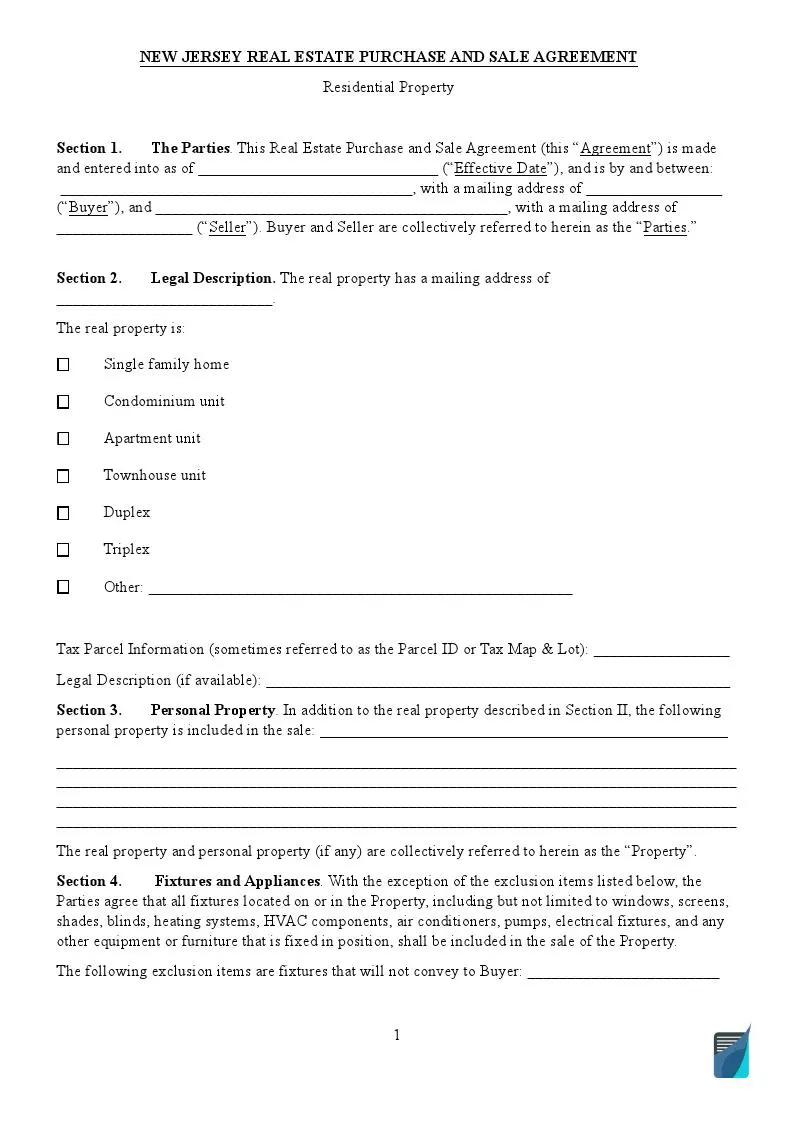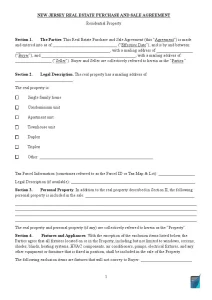New Jersey Real Estate Purchase Contract
Selling or buying a home is not as scary as you might think. However, such a serious step still requires special preparation and a certain amount of paperwork. When almost all stages have been passed, the buyer and seller sign the New Jersey Real Estate Purchase Agreement. That is the document we will talk about in this article.
You will find out what features the contract for the sale and purchase of a residential and commercial real estate object typically has. We will especially highlight disclosures that must or recommended to be made, giving this aspect most of the article.

Build Your Document
Answer a few simple questions to make your document in minutes
Save and Print
Save progress and finish on any device, download and print anytime
Sign and Use
Your valid, lawyer-approved document is ready
New Jersey Residential Purchase and Sale Agreement
Usually, such a printable purchase agreement form is drawn up by the buyer of the property. It specifies:
- Details of the parties to the transaction
- Residential real property’s details
- Manner of payment
- Items included (or not) in sale
- Quantity of title
- Disclosures
- Any special terms and terms
- Signatures including date and printed names
Once the buyer has specified all the terms in the real estate sales contract, they send it to the seller, who may or may not accept it. Usually, the parties negotiate to conclude a deal that suits both parties. When an agreement is reached, both parties must sign the document. It will be considered legally valid from that moment on, and the parties must begin to fulfill their obligations.
New Jersey Commercial Purchase and Sale Agreement
An agreement for the sale of commercial real estate is practically the same as an agreement for the sale of residential property. The contract must also contain all the necessary information about the parties to the agreement, their financial and timing clauses, have a description of the property, and reflect all conditions and terms.
Once both parties agree on the document’s contents, they must sign it. It will also not be superfluous to put the signatures of witnesses.
Inspection of the Property
Although buyers of residential real estate often include this clause in the contract, it is almost mandatory for commercial real estate. This clause leaves it to the buyer to inspect the property with the help of a certified inspector. The specialist must identify any significant defects in the house and decide on the general condition of the systems.
The agreement specifies which identified defects might lead to contract cancelation. Furthermore, the seller can fix the problem by repairing or replacing the equipment or defective part. They can also decide to reduce the price. It usually suits the buyer, and the transaction is considered relevant. At the end of the negotiations, an additional agreement is drawn up, which will be an obligatory part of the main one.
Required Seller Disclosures in New Jersey
The New Jersey State Court adopts the principle of “common law,” which means that buyers must be informed of all known defects in the property, both residential and commercial. Therefore, if the seller does not want protracted lawsuits in which they could either lose or simply spend a lot of time, it is worth thinking about communicating all the information to the buyer as honestly and thoroughly as possible. As a last resort, parties will reduce the property’s price or not close the deal. It is most likely a better option than a lawsuit.
Lead-Based Paint Disclosure
This disclosure is required by every state within the US and applies to homes built before 1978. According to § 4852d of 42 US Code, the seller must provide this disclosure for all homes built before the above period to warn the buyer about the possible use of paint, which is harmful to humans. This statement will show whether it was used or not. The document can be obtained from the building department.
Seller’s Property Disclosure Statement
According to § 46: 3C-10 of New Jersey Revised Statutes, the seller must provide this document to the buyer. The law mentions several times that disclosure of information primarily protects the seller from further claims. It is up to the seller to report and the buyer’s business to take note of this information.
It is imperative to disclose all the details that may be dangerous to the life and health of the buyer. It can be one of the following factors:
- Radon test results
- Mold availability
- Methamphetamine laboratory that is or was in the house
- Hazardous burial
If one is in possession of such information and does not inform the buyers about it, then lawsuits will be lawful against the seller. And if proven guilty, then the penalties can significantly exceed the amount by which the price of the house would have fallen if the information was disclosed.
In addition to the listed points, any concealment of information, its omission, or the provision of false data can lead to losses for buyers or make the property unsuitable for living, which can become a reason for a lawsuit. The legal basis for such a case in New Jersey would be misleading or fraudulent practice.
Home Improvement Disclosures
A standard contract usually includes the absence of any home improvements. But if such work was carried out, the seller must necessarily indicate this in the agreement. The buyer must be sure that all work has been done following all regulations and permission from the municipality. And the buyer will want to make sure that the property tax already includes an added assessment based upon the property as improved.
If the transaction reveals that the seller did not inform the municipality of significant changes to the house (for instance, any extension or new bathroom), they will have to pay taxes in the form of an “omitted assessment” at the settlement.
But one should not be calm if this violation took place but was not disclosed during the transaction. In this case, the buyer will be forced to pay the missed taxes. And this gives them the right to sue the seller.
Separately, it is worth mentioning the “non-material defects” of the house. These features include murder in the house, suicide, an accident, or even the presence of ghosts (if you believe in them). Under New Jersey law, the seller is not required to report such items. But also, if the buyer asks directly, it is advisable to give honest information.
To Sum Up
Remember that you attract potential buyers by disclosing information to them. Your honesty also protects you from possible legal claims.
Lack of disclosure can scare prospective buyers away, as they think something is wrong with the property. You can trust us when we say that their imaginations can be much worse than reality. It is best if you give the buyer information about the repair work carried out in the house, the condition of all systems, and the presence of any defects and hazardous materials (if any).
It is better to give information than be afraid that you will be sued in the future.
